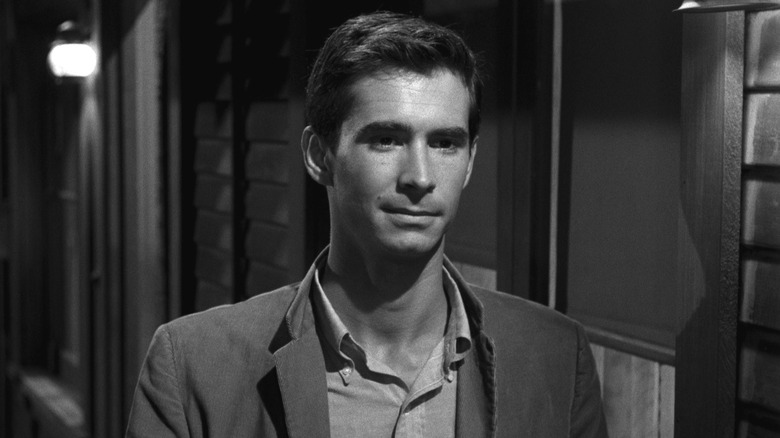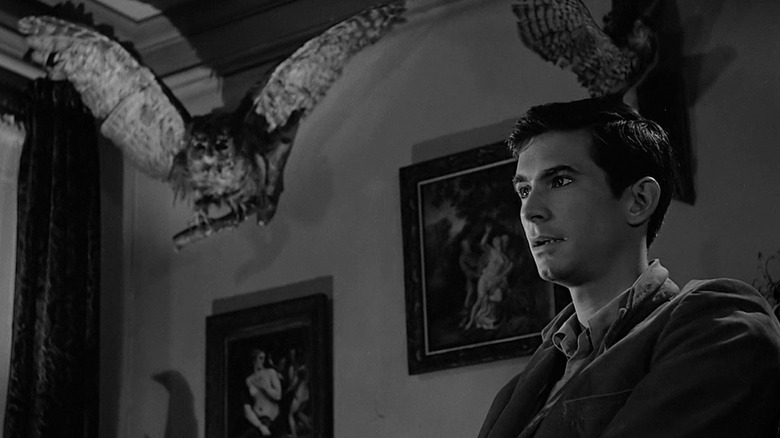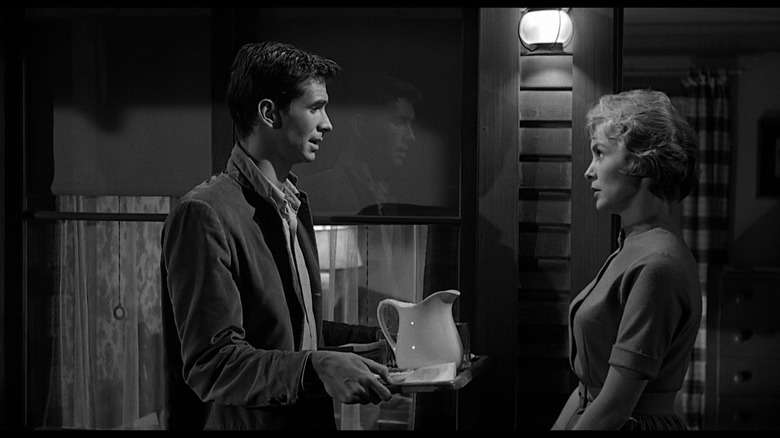It's 2025 And I Just Watched 1960's Psycho For The First Time - These Are My Honest Thoughts
We all have hot takes that are considered blasphemous in the court of public opinion. Everyone dislikes and feels ambivalent toward at least one movie that's widely regarded as a classic, and that has long been my relationship with Alfred Hitchcock's films. For the most part, they're fine, but they rarely captivate me on an emotional level and often strike me as pompous and dull.
This brings us to Hitchcock's controversial horror classic "Psycho," a movie I (unintentionally) avoided until 2025 for a few reasons. We can chalk this up to the apathy I've felt toward the director's work after not being blown away by his other beloved classics — "North by Northwest," "Vertigo," "The Birds," etc. — so I haven't exactly hurried to fill in the blind spots. Secondly, when it comes to slasher films, I prefer them to be fast-paced, chaotic, and trashy, so I assumed a "classy" one like Hitchcock's game-changing horror might bore me. Finally, "Psycho" is so culturally significant that I was already familiar with the story's twists, turns, and most memorable scenes (or so I assumed) and didn't feel compelled to watch it.
Now, are you ready for a twist even Hitchcock himself might appreciate? My tastes have evolved since I last gave Hitchcock's films a chance, so I went into "Psycho" with a sense of optimistic curiosity that I probably wouldn't have felt until 2025. So, without further ado, here are my thoughts on "Psycho."
Psycho is more fun than I expected
Due to my long-held belief that Alfred Hitchcock movies are boring, I went into "Psycho" expecting an elegant, beautifully shot, dull thriller. I was wrong. To my surprise, the film is biting, visceral, and highly entertaining, with an aesthetic that takes cues from cheapie Poverty Row noirs and exploitation movies (this was by design, as Hitchcock made "Psycho" with a shoestring budget in exchange for creative control). "Psycho" was made with a similar sense of urgency to those flicks, and Hitchcock having autonomy allowed him to push the envelope — and you get the impression that he did so while smoking a cigar with a cheeky twinkle in his eye.
Hitchcock once said that "Psycho" was never supposed to be serious, as his goal was to make a movie that felt like a haunted-house adventure or a theme park ride. To his credit, he pulled that off with aplomb. "Psycho" is designed to pull the rug out from under viewers, and some moments genuinely surprised me, even though I went into the film (wrongfully) assuming I knew everything that would happen. What's more, the film accomplishes its thrills in a way that walks a fine line between darkly humorous, psychologically disturbing, and sensationalized, which are hallmarks of the great exploitation flicks of yesteryear. I was surprised to discover how long it spends being a noir movie before segueing into horror territory, but the genre mashing never makes for a disjointed viewing experience.
Still, this is still a Hitchcock movie we're talking about, so it's much more technically adept, thematically complex, and groundbreaking than your average exploitation flick from the same time period. "Psycho" tore up the rule book, but Hitchcock was clearly having a ball when he made it, and it shows.
Psycho empathizes with its protagonists' fears
Much has been written about the bait-and-switch in the middle of "Psycho," which sees Norman Bates (Anthony Perkins) murder Marion Crane (Janet Leigh) while she's taking a shower in his motel after she spends the day on the lam. Viewers with no prior knowledge would be forgiven for assuming that Marion is just stopping by before continuing her journey the next morning, as the film's entire first-half set up is staged like her getaway story.
This set up makes the twist more effective, and despite knowing all about it going in, Marion's journey still packed a punch, as the first half of the movie does a terrific job of squeezing tension out of the guilt and fear she feels during her descent into criminality. From being pulled over by a cop while in possession of stolen money to her desperately acquiring a new vehicle, "Psycho" forces viewers walk in her shoes, desperately hoping for some respite.
Not only that, but "Psycho" observes Norman's crimes with the same level of attention. The movie forces us to understand its villain's fears and paranoia as he tries to cover up his atrocities, from dragging Marion's body out of the shower to dumping her car in a lake. That sequence is dialogue-free, and "Psycho" takes its time documenting the entire shady process, with all of Norman's feelings on display.
"Psycho" is masterful in making viewers understand what fictional characters are feeling during their most questionable and wicked moments, and Hitchcock deserves credit for that. After seeing finally seeing the movie, I'm also willing to give his other movies another chance.


